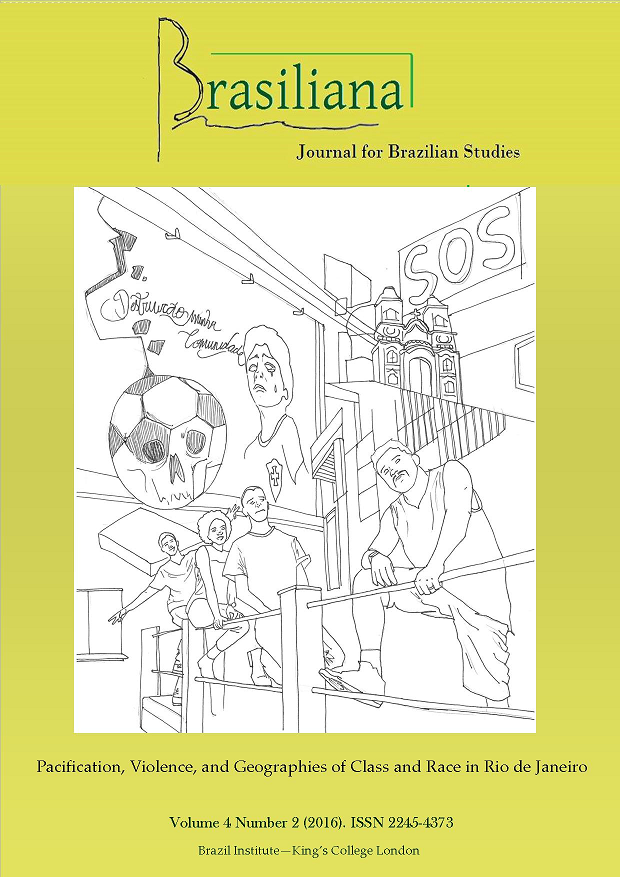Rio's Feminist Funk: An Undulating Curve of Shifting Perspectives
Main Article Content
Abstract
Article Details
![]()
Articles published in Brasiliana are licensed under a Creative Commons Attribution-NonCommercial-NoDerivs 3.0 Unported License.
When publishing open access, the author signs an author publishing agreement in which they retain copyright and give Brasiliana the right to publish the article. Our Open Access publications are distributed under the terms of the Creative Commons Attribution 4.0 International License, which permits unrestricted use, distribution, and reproduction in any medium, provided the original work is properly cited.
References
Alves, Branca Moreira and Pitanguy, Jaqueline. 1985. O Que é Feminismo. São Paulo: Brasiliense.
Amar, Paul. 2013. The Security Archipelago: Human-Security States, Sexuality Politics, and the End of Neoliberalism. Durham and London: Duke University Press.
Baumgardner, Jennifer and Richards, Amy, 2000. Manifesta: Young Women, Feminism and the Future. New York: Farrar, Straus, and Giroux.
Cevasco, Maria Elisa. 1999. “Importing Feminist Criticism.” In Brazilian Feminisms. Eds. Solange Ribeiro de Oliveira and Judith Still. Nottingham: University of Nottingham Monographs in the Humanities.
Coelho, Frederico. 2006. “Rappers, Funkeiros e as Novas Formas Musicais da Juventude Carioca.” In Comunicação, Consumo e Espaço Urbano: Novas Sensibilidades nas Culturas Jovens, Edited by Everardo Rocha, Maria Isabel Mendes de Almeida & Fernanda Eugenio. Rio de Janeiro: Mauad/ Puc-Rio
Essinger, Silvio. 2005. Batidão: Uma Historia do Funk. Rio de Janeiro: Record.
Garcia, Carla Cristina, “Os Novos Feminismos e os Desafios para o Século 21,” Revista Cult. March 2013. http://revistacult.uol.com.br/home/2015/03/os-novos-feminismos-e-os-desafios-para-o-seculo-21
Instituto Brasileiro de Geografia e Estatística (IBGE). “National Household Sample Survey” 2000 Census. http://biblioteca.ibge.gov.br/biblioteca-catalogo?view=detalhes&id=787
Jameson, Frederic. 1991. Postmodernism, or, The Cultural Logic of Late Capitalism. Durham: Duke University Press.
Leitão, Eliane Vasconcellos. 1988. A Mulher na Língua do Povo. Belo Horizonte: Editora Itatiaia.
Misse, Michel, “Malandros, Marginais e Vagabundos: Acumulação Social da Violência no Rio de Janeiro”, Doctorate thesis. p.23 Rio de Janeiro: IUPERJ, 1989.
Perdue, Derek. 2010. “Sou Marginal Mesmo (I am the Real Hoodlum): Using Violence as a Resource in Brazilian Hip Hop.” In Ruminations on Violence, ed. Derek Perdue, 150-172. Waveland.
Penglase, Benjamin. 2010 “The Owner of the Hill: Masculinity and Drug-Trafficker Power in Rio de Janeiro, Brazil.” The Journal of Latin American and Caribbean Anthropology 15 (2): 317-337.
Ross, Andrew. 1994. “The Gangsta and the Diva.” in Black Male – Representations of Masculinity in Contemporary American Anthropology, ed. Thelma Golden. New York: Whitney Museum of American Art.
Schnall, Marianne. 2014. “Things Maya Told Me: My Favorite Insights and Quotes From My Interviews With Maya Angelou.” http://www.huffingtonpost.com/marianne-schnall/maya-angelou-legacy_b_5418585.html
Still, Judith. 1999. “Introduction: Identity and Difference.” In Brazilian Feminisms. Eds. Solange Ribeiro de Oliveira and Judith Still. Nottingham: University of Nottingham Monographs in the Humanities. 43.
Straus, Tamara. 2000. “Jennifer Baumgardner and Amy Richards create a manifesto for Third Wave feminism”. http://www.metroactive.com/papers/cruz/11.29.00/feminism-0048.html
Vianna, Hermano. 1998. O Mundo Funk Carioca. Rio de Janeiro: Jorge Zahar.
Vianna, Hermano, “A Voz Não Cordial.” Folha de São Paulo. 2002.

